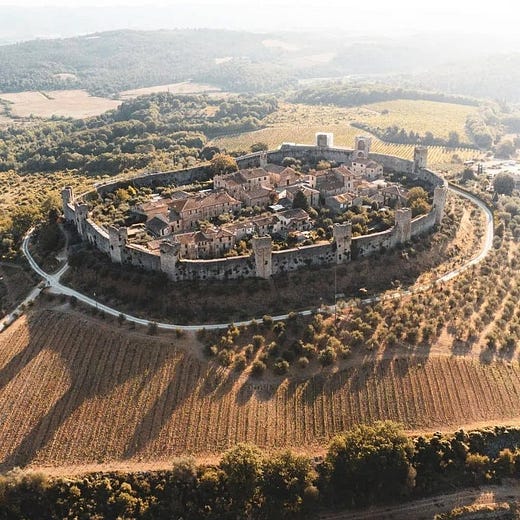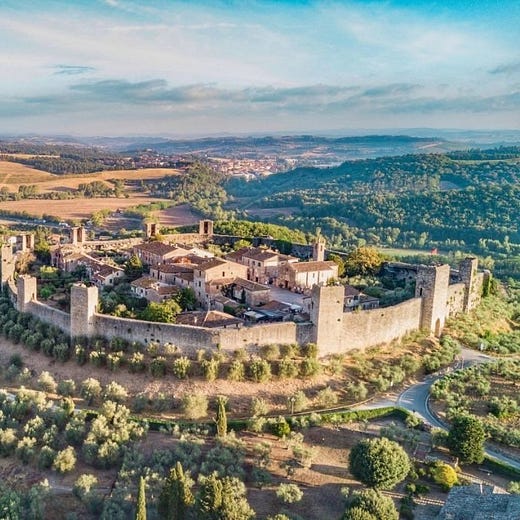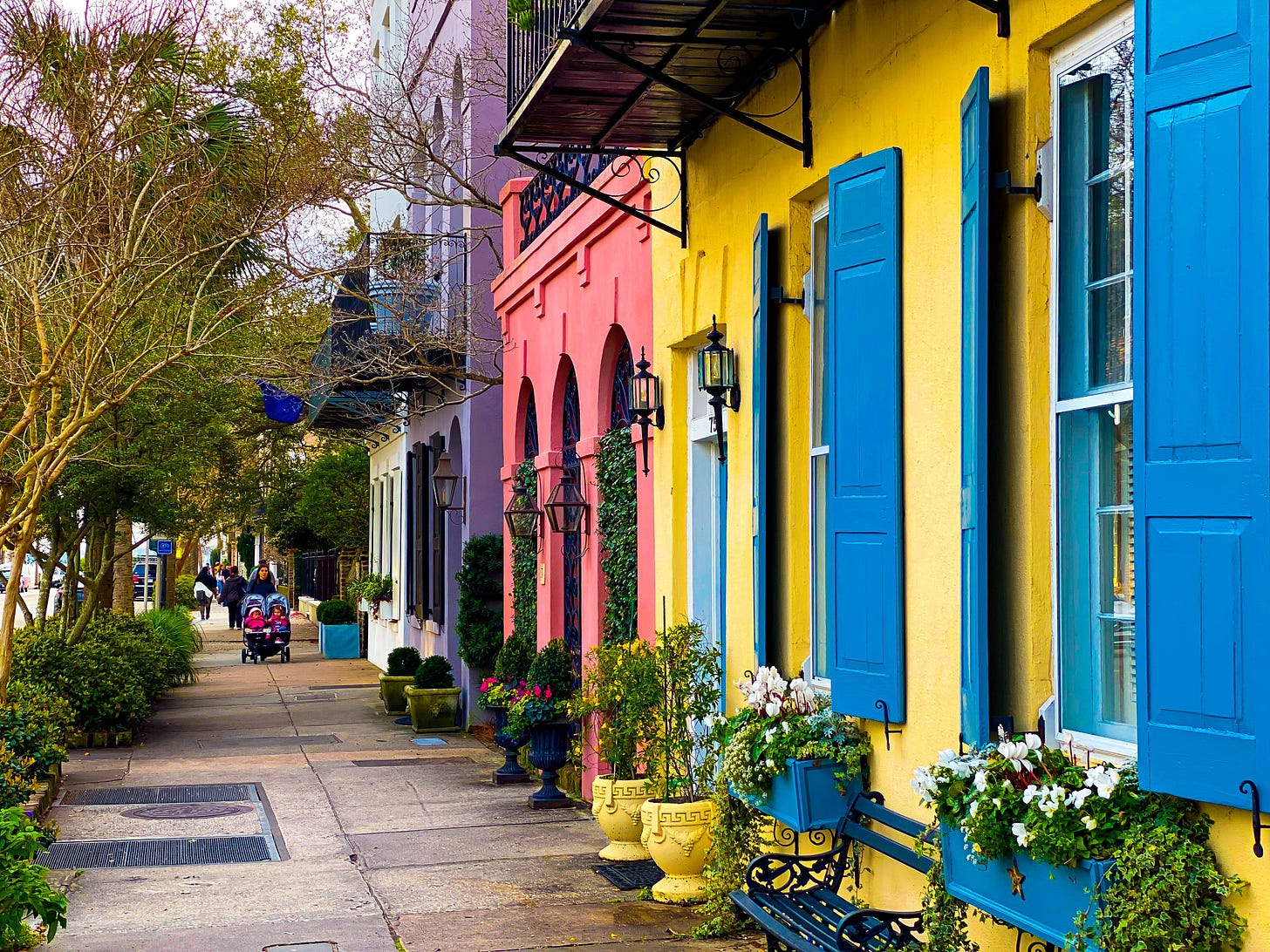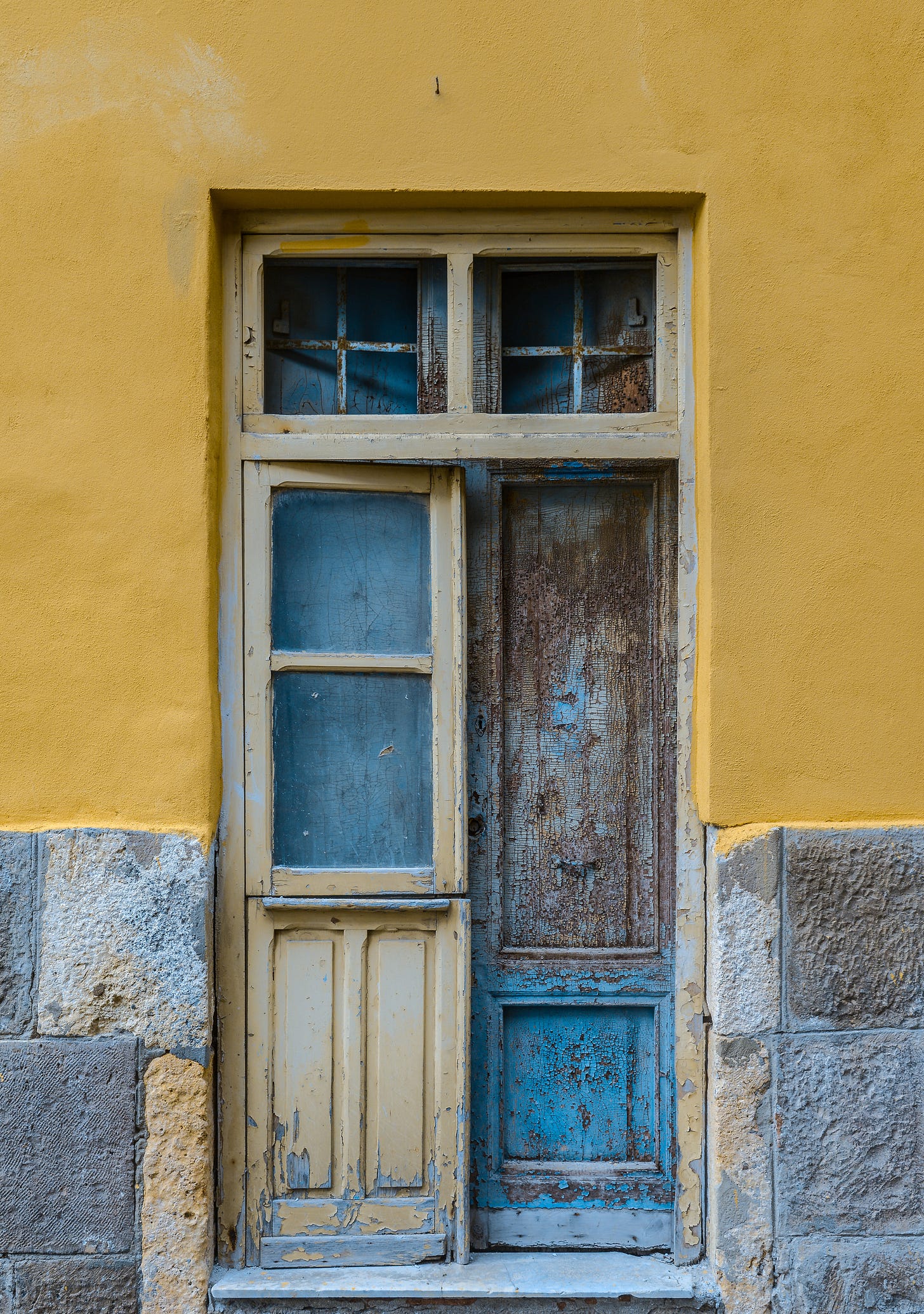Interview: Montanoso – Crypto Co-Op in Texas Hill Country
Andrew Hitchcock on neighborhood DAOs, DeFi real estate, digital settlers, flying taxis, small windows, sweat equity, medieval walls with QR codes, and building a village in the hills of Austin.
You’re reading Startup Cities, a newsletter about startups that build neighborhoods and cities.
This week: an interview.
I have a few goals for these interviews:
To take innovators seriously, even if an idea sounds weird.
To ask the questions that an intelligent skeptic would have about an idea.
To go deep. No grand “TechCrunch visions”. How does the thing actually work?
Let me know what you think.
Andrew Hitchcock is a software engineer and founder of Montanoso. He writes on his website.
Themes:
Montanoso as Exurb
Crypto in Montanoso, Radical Markets, and the Usefulness of Token Fungibility
Crypto Sweat Equity
DeFi, Rejecting the REIT, and the Power of Low Transaction Costs
Building for Digital Settlers, not Digital Nomads
Target Density, Commutes, and Flying Taxis
Community as Value Prop, Dominant Assurance Contracts, Quadratic Funding, and The Bingo Card of Cool Governance Ideas
Italian Tradurbanism, Cobblestones, and Those Big Romeo And Juliet Towers
Patina, City Walls, and that “Lived In” Vibe
Shared Values, Pluralism, and Avoiding the Culty Stuff
As always, feel free to skip around!
Meet Andrew
Who are you and what are you building?
I'm Andrew Hitchcock and I'm building Montanoso, a neighborhood DAO.
What’s a neighborhood DAO?
I sometimes call it a crypto co-op. The idea is that it's a new organizational structure for building communities. It offers shared ownership of the community so that people can have a say in how their communities are governed and it aligns incentives between people that live there.
The neighborhood DAO is the general concept. The first implementation is Montanoso. This is a model that can be shared among other communities. But Montanoso is where we’re putting these ideas to the test.
Are you a software guy? I get the impression you’re a software guy.
Yeah, I spent my career working for Amazon and Google doing distributed systems.
How does someone end up deciding to build a quasi-Italian crypto city state in Texas hill country?
*laughter*
I've been interested in cities for a long time. I like urbanism and design. And I wanted to live somewhere that has really good urbanism.
Originally, I thought about applying this to a mega city. I think we could make cities a lot better, but it's hard to get started. There's a lot of capital requirements. It's hard to get people to move there.
Over the years I've been working on the idea and scaling it down until I came up with a small village. We can make a small village with good urbanism. We can make it outside of a city center so it's not as hard to get people to move there; you’re still 45 minutes outside of a town with cultural amenities.
Montanoso as Exurb
Why Texas? Why Austin?
I left Seattle last year. I tried Miami at first — that was one of the other tech exodus cities. But it wasn't quite a culture fit for me. All the land near Miami is taken: it’s either developed or swamps.
The nice thing about Austin is that there's lots of fairly rural land pretty close to the city. Also, there's minimal building and zoning codes. You can build a lot of crazy stuff out here and it’s lightly regulated. I thought it would be a good place for experimentation.
There's a lot of other interesting projects in Austin that seem aligned with the vision. There's a big Urbit community here. There's a lot of people that are interested in crypto and real estate including my neighbor CabinDAO.
You position Montanoso as an alternative to U.S. metros which you describe as "high cost" and "poorly run." What do you mean by that?
In terms of high cost, a lot of these cities have been inflicted by NIMBYism. They just don't want to build new housing. They've been frozen in time since the 70s. So there's a nice inner city and then they're surrounded by suburbs. But they don't want to upzone the suburbs.
I spent my entire life in Seattle. A lot of what I see and observed came from living in Seattle for 35 years. There's the inner city that they don't want to upzone. The prices just skyrocket because there's not a lot of housing: the only housing being built is condos. These cities just don't build any homes. The prices go up and up and up and we're seeing that the last few years especially.
In terms of poorly run... I feel like most modern cities don't focus on the services they provide. If you look at what they talk about and what they do, they're not like a private company. They're not trying to deliver the best service at the lowest cost. They often get bogged down in these other interests.
There’s a lot of special interests in cities. Consider buses. If you look at what buses do, they're a place for the homeless to stay warm during the day, they have these meandering routes, no one can be more than two blocks from the bus or whatever.
They’re not really designed to be clean, fast, efficient and to get you somewhere sensibly. There's all these veto powers from the people who live in a city. A lot of services cities provide aren't really focused on increasing the quality of life.
There’s also a lot of corruption. It’s just not good administration. I think a lot of the NIMBY thing is because of your interests as a homeowner. If something gets built near you, it doesn't really benefit you that much and in fact it probably hurts you. It's a way of externalizing the costs.
What do you mean?
Let's say you like to live in a suburban neighborhood right? If you can block everyone else from building there, it's good for you. You get to keep your nice home that you own and then no one else can build near you. You're externalizing the costs of the way you want to live.
[See last week’s Owned is Beautiful for a similar argument about the dynamics of subdivided property.]
Crypto in Montanoso, Radical Markets, and the Usefulness of Token Fungibility
What's the role of crypto in Montanoso?
One of the ways I came to this crypto co-op idea was that you want to align the incentives between the homeowners — the current residents — and also the future residents.
If you give the current residents a share in the upside of the city as it grows, then there's less reason for them to avoid it. There's less reason for them to oppose building new homes and new amenities because then their share in the city increases and it becomes more valuable for them.
Crypto provides an ownership and governance structure for the city. It's like taking like an old fashioned co-op and putting it on-chain. The tokens represent ownership of the community. They give you governance rights because the more tokens you own the more voting power you have.
There's a lot of ways you can do that: straight one token one vote, or you can do a radical market [referring to Eric Posner’s book Radical Markets] type idea where you do quadratic voting. There's a lot of different options here. It's flexible. The beautiful thing about crypto is that it’s all programmable. You can implement whichever one fits your needs.
The benefit of having these fungible tokens on the Blockchain instead of just some legal ledger somewhere for a co-op is that they're fungible. They can plug into all of the DeFi ecosystem so you can get loans against your holdings and stuff like that.
The other benefit of owning these tokens if you live [in Montanoso] is that it gives you a discount on your rent. The more tokens you own, less rent you pay. So it's like a hybrid rental/ownership model where you can trade off how much you want to own versus how much you want to rent depending on your needs at that time.
Crypto Sweat Equity
One of the common gripes with traditional co-ops is that the administration of many co-ops is full of factionalism and lots of arguing and drama.
Why do you think there’s a benefit for having residents also be the owners of the enterprise?
Full disclosure. I've never lived in a co-op. But I think there's the incentive that you want to have skin in the game of the community.
If you own shares of the company that owns your home hopefully you'll treat your home better. You'll treat the neighborhood better. You'll do stuff to improve your neighborhood. It sort of aligns the incentives more than if it was just owned by some big rental company.
Then there's interesting things you can do where if you put in work to the community — like you build a trail or do some work that increases the value of the community — they might award you tokens as literal sweat equity for the labor you put in.
That's an interesting idea. How do you rationally price a sweat equity contribution?
I don't know if it has to be rationally priced. I think of this more as just a bonus for the residents that have put in work. I think people want to put in work anyway because that's where they live and they want to see their community better.
I don't think it's like, “Oh we have to figure out if this person put in $20 an hour of work for five hours then we'll give him this many tokens.” I think you can say, “Thanks for the work you did here is a bonus.” You can do it post-hoc and award people for work they've done. Someone can put it up to a vote.
Or you can put up bounties saying these are the things we want done. Here's how many tokens we’ll do for each of them. I think the community can decide on that.
You can have a vote of the token holders. I don't think we have to come up with a strict salary or payment for these things. I think it's just whatever the community decides that they want to reward someone.
DeFi, Rejecting the REIT, and the Power of Low Transaction Costs
It feels like it feels like in your crypto arrangement you're rejecting traditional real estate tools like the REIT or the traditional C Corp.
Instead of issuing stock or buying back stock it’s issuing tokens and buying back tokens. What would you say are the reasons not to go the traditional route and do this all on chain?
Crypto in many way is going to be the monetary financial system of the future. Since it's programmable and interoperable, there's a lot of interesting things you can do with it that makes it hard to do in the traditional world.
There's high barriers to entry. You have to hire a bunch of lawyers. Things don't play well together. But with with crypto and DeFi you get all this stuff for free like voting tools and DeFi lending tools and swapping tools. You can swap things easily and it's all very permissionless.
If you wanted to sell some shares, some tokens of the community, you can just go to UniSwap or whatever and sell them immediately. You don't have to talk to the corporation, there's no contracts you have to sign. You sell it and then you have your you cash or whatever. I think it's a lot more open and easy to work with.
And it’s software. So if we want to have tens of thousands of neighborhood DAOs in the future then they can just instantiate a new token and it plugs into everything. They don't have to pay lawyers or set up C Corps.
It sounds like there's an argument around transactions costs, right? That DeFi craters these costs and removes a lot of friction and that this is a benefit of going the crypto route rather than dealing with the incorporation laws in Delaware etc.
Yeah, we're seeing a lot of stuff like this: syndicates, investment clubs, basically putting it on chain. It just makes a lot of stuff easier.
Right now we have some number of corporations and some number of other investment clubs. But if you put it all in software and make it really easy to use and relatively cheap, then you can see a 10x explosion in the number of these clubs or whatever you want to call them.
Building for Digital Settlers, not Digital Nomads
I have this tweet here from you, it says that in Montanoso you “own the community” and you “rent your home.” And that “makes it easy to move within the village as life circumstances change.”
What does this mean?
I feel like a lot of people are building places for digital nomads. Places for people who want to travel all the time. I want to build somewhere that works for digital settlers. People that maybe work online and want to create a stable community, live somewhere maybe for their entire life if they want.
Throughout your life you live with your parents, maybe you move out to your own place, you have your own family, then maybe you downsize again. You go through this lifecycle of homes. Your circumstances change.
Your parents maybe owned. Then you rent for a while. Then you buy. Today, each time there's these transaction costs — especially if you're buying: 6% for realtors and all these taxes. You might have to pay the fees and stuff. Title companies.
The benefit if you own the community is you don't have to sell any tokens to move units. If there's another place available in the community that you want to move to, you can just end your lease in one place and start a lease in the next place. You still hold all your tokens. So there's no taxable event there.
Let's say you give your tokens to your kids when you die. You have three kids. Instead of giving them a house you just give them the tokens and then they each have a third of the tokens that you had. They can put do these tokens towards their home if they want and continue living in the community and getting the benefit.
You refer to Montanoso is a village in various places. Does that mean that your idea of Montanoso is forever small? Do you have a population target?
I'm thinking of 15 to 20 homes as the target size.
I think this project will be pretty small to begin with because I want to build it on this hilltop and the hilltop is only so big. I think creating this small community is a good first step to prove the idea.
I don't know how many people that would be — depends on the family sizes — but yeah, 15 to 20 homes plus maybe some rental units for visiting guests and maybe some offices and other things amenities for the neighbors, for the community.
Commutes and Flying Taxis
Density tends to make more money. How do you make the economics work with such a small population as your target?
I think the fact that it's outside of a larger city means we can benefit from the cultural amenities of that city and the job market. That’s how the economics will work.
I think a lot of people that will want to live here will be people that work online or work remotely or have nontraditional jobs where they can just be at home. But for people that do want to work in the city, well, it's 45 minutes from Austin. So they can commute if they only commute twice a week or something. I think in the not too distant future, if these flying taxis take off, then we'll be a lot closer to awesome. It'll be part of an even bigger job market.
The worry that I have is the "order without design" thesis [referring to Alain Bertaud’s masterwork Order without Design]: that the density of the city is proportional to the value of the land. So this is a bit weird because we're building a dense community in a rural area, which doesn't really happen anymore.
If you look at old England or something, there's a bunch of clusters of little villages throughout the countryside. They used to do stuff like this. Rarely does it happen in modern times. You rarely get a dense cluster in a rural area. And so that's one thing to worry about.
I think if flying taxis happen this will become a lot more common because then you just live in a dense community, walk everywhere where you want to go, and then walk to the flying helipad when you want to commute to a different village or into downtown.
Will you be off grid?
The goal of the city is not to be off grid, but it's to be resilient.
Right now we'll have well and septic because those services aren't out here. But we do have a connection to the power grid. As we grow I'd like to develop a little resilient microgrid.
We'll get some solar panels and some batteries so that we can withstand a future Texas winter storm. But the goal is not to be fully self-sufficient with food or electricity or anything like that.
When you look at getting this thing up and running, what are the most expensive upfront costs for the model?
Everything in real estate is pretty expensive. Homes cost a lot of money. Just getting the land and the initial home setup is I think the highest cost.
For the initial residents we want to get people out here as soon as possible. So I'm looking at prefab homes, something we can just bring out here as quickly as possible.
They won't be the long term form of the city, but somewhere where people can get here on site as quickly as possible and maybe a little bit cheaper. Quicker time to market. But yeah building the physical structures is pretty pricey.
“More Community,” Dominant Assurance Contracts, Quadratic Funding, and The Bingo Card of Cool Governance Ideas
You list a desire for "more community" as one of the attractions of Montanoso. Community is a slippery concept. What does community actually mean to you?
Is it "I see people that I already know when I walk down the street" or "I have dinner once a week with my friends?" What is the concrete form of “community” in Montanoso?
I think it's seeing the same people every day. They don't have to be your friends, but acquaintances: people you see in town. Familiar faces.
I think community doesn't have to be having a dinner party every week with the entire village. I think it's just the routines and people that you see all the time.
To give an example, during the pandemic I lived in downtown Seattle. Everyone left; all the Amazon employees left. But my coffee shop stayed open. It was only the people that lived in the neighborhood that would go there.
So it's a very small group of people that hang out there and you see them every day. This was a great form of community for me because there's just people I would see every few days and recognize their faces. I don't necessarily know their names, but it gives you a sense of being in a place somewhere that has a community.
You earlier mentioned Eric Posner's book Radical Markets. You praise the management ideas in the book and frame them as a radical HOA.
I read these ideas as a bingo card of geeky stuff that I also like: quadratic voting, dominant assurance contracts, version controlled community rules, software layers.
But I wonder if your thinking has changed as you've gotten deeper into into this project. Are there things now that you think are unnecessary? Are one of these things absolutely critical?
Where do you stand on this Bingo Card Of Cool Ideas?
My problem right now is getting people out here as quickly as possible. So all the rest is on the back burner. I think there's a lot of interesting ideas in Radical Markets like quadratic voting for public goods. I really like the idea of like the Harberger tax to determine rent or whatever.
But I also think it would probably be unpopular having to bid on your own home every year. Those ideas make a lot of sense at a larger scale, in a city of 100,000 or more. But if you're in a community of 25 people, I wonder if they're they're not necessary if you can come to consensus.
You can have a town meeting every month. People chat or whatever. You could probably come to a consensus, especially if you've established this community with people that you know want to live a similar life.
I don't think have to use all of those ideas at the small scale. So if you could have a bunch of these small communities — condo building size, the neighborhood size — I think these ideas might not be necessary.
I still imagine in the future as the community wants to build amenities like a gym or something using public goods funding, quadratic funding for something like that.
Italian Tradurbanism, Cobblestones, and Those Big Romeo And Juliet Towers
Let's talk architecture.
It seems like you're modeling Montanoso after cities like San Gimignano in Italy, which is a city I’ve visited and coincidentally wrote about last week.
It's a beautiful place, but why choose it? Why the tradurbanism of an Italian city state?
San Gimignano was just one of the many inspirations. There's a lot of places I think that have good urbanism.
Recently I've been looking at photos of Catfiddle Street in Charleston which I think is a development on a similar scale to what I will do here. I think people just like places like that. Look at how popular tourism is to these places.
There's something right about it if people want to go there and spend time there. Communities like that command a lot of money in the United States. If you want to live in a neighborhood like that, it's usually pretty pricey. These are really desired forms. I think it's being under-supplied right now in the US.
There's other benefits of these traditional forms. For example, I think floor to ceiling windows are overrated. I think you want a smaller windows to provide more insulation, to give you a framing of your view, to give you more privacy.
If you build with really durable, strong, heavy materials it provides a thermal mass that helps provide comfort for the community. If you’re next to a building it buffers the internal heat. I think these are really good places to live.
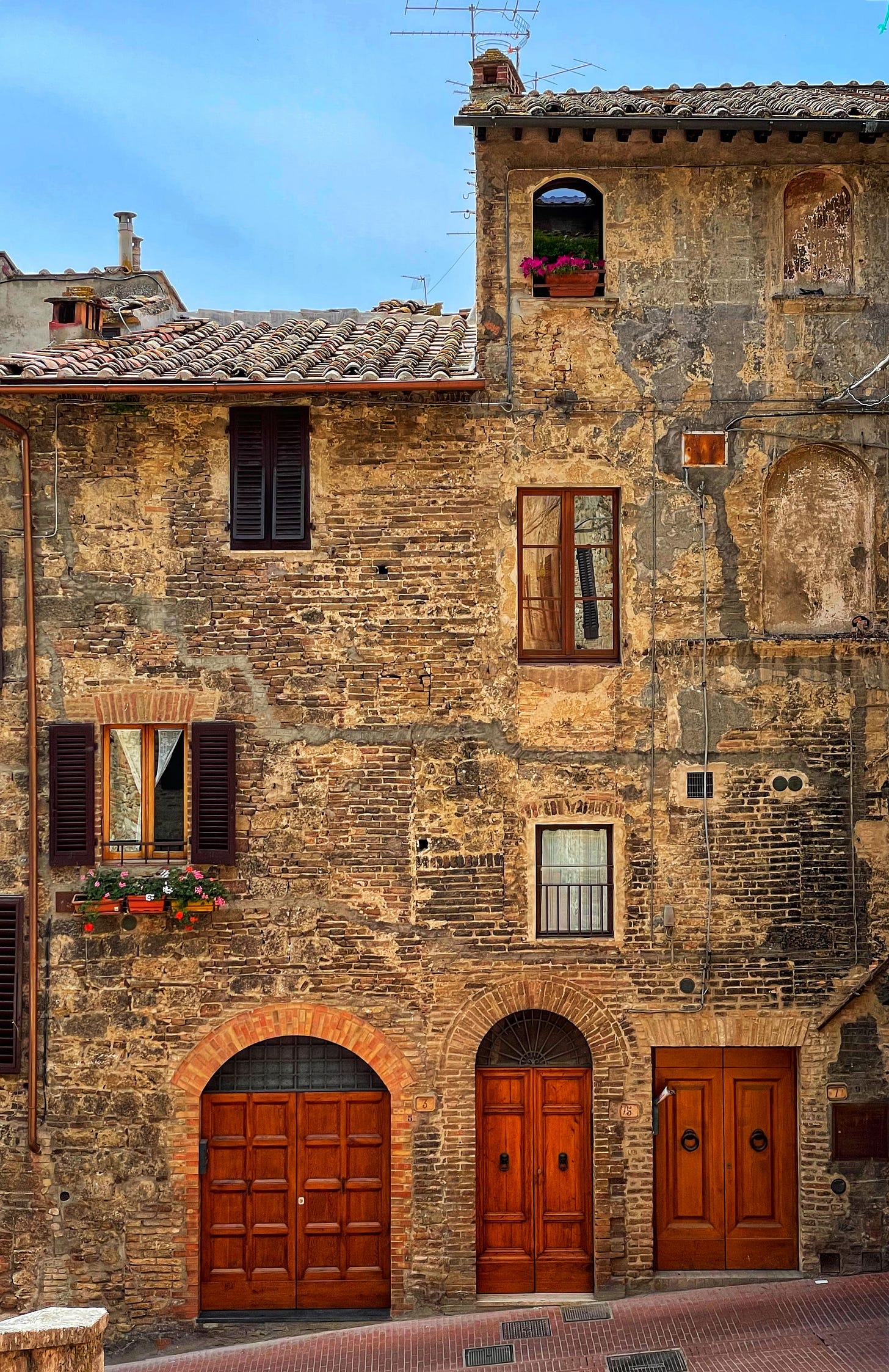
Where's the boundary for traditional architecture for you?
Are you literally going to build out of giant stones and dirt roads and cobblestones or is it more like a New Urbanism thing where you put stone facades on steel buildings?
I would like to build traditionally. We haven't got to that phase yet. Like I said, I'm looking at prefabs to begin with.
I think it would be cool to build the traditional way. In some ways I consider Montanoso almost like an art project. We'll build and hire craftspeople to do beautiful buildings to show it can be done. This will instantiate the neighborhood DAO concept.
I'm not opposed to modern materials, but I worry things that off-gas. I want to live somewhere healthy so I worry about some of these materials that are made with tons of glue and chemicals.
I'm still thinking here. Part of the reason I wanted to move out of the city is just so I could have do physical labor. I think if the people in the community want to put in some cobblestones that'd be a fun project. It would be a bonding exercise for the community. It could be fun.
Then it would be the satisfaction of saying “Oh I put in this cobblestone road!” Your kids will see it. I think that has a big draw to it.
Most importantly, will you have those epic skinny medieval towers to protect your ruling families?
*laughter* I do want to put in a town wall or encircle the hill in a wall!
Patina, City Walls, and that “Lived In” Vibe
Let's talk about the wall.
So you want to surround Montanoso with a wall, Italian City State style.
Why do this? Isn't it expensive? I assume you're protecting residents from invasive coastal transplants like me.
*laughter*
I think walls have a good aesthetic. It provides a sense of comfort in a way. It creates like a nice boundary around your town. The only thing that we will actually be keeping out here is deer. Maybe you have a rose garden inside and you don’t want deer coming and eating them all the time. There might be practical benefits.
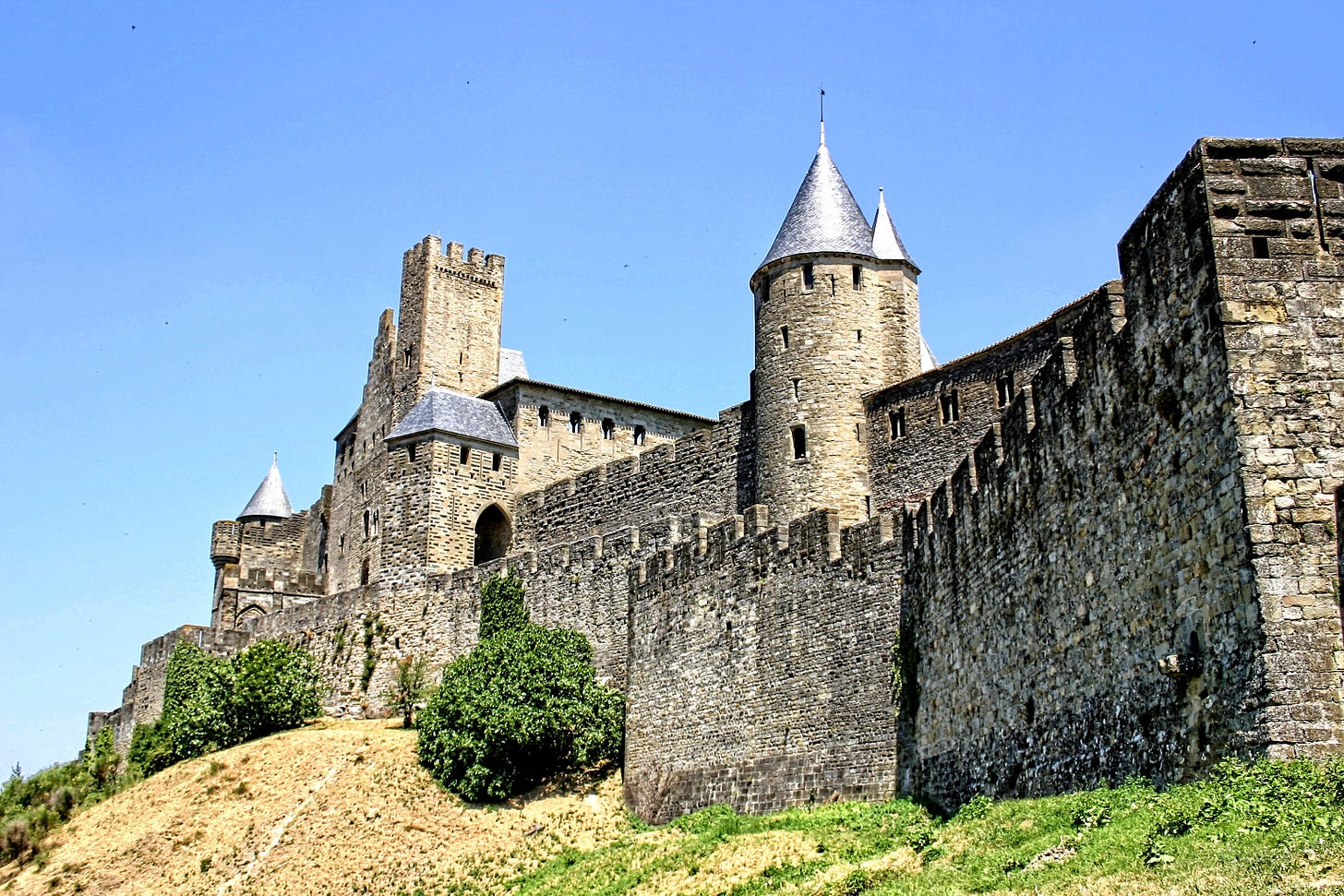
I saw that you were considering crowdfunding this wall with named bricks, is that true?
That's the idea I have. The wall is far down the list of projects.
But I think it’d be hilarious to sell one of 10,000 PFP bricks where you can buy a brick that has a QR code on it. And then if you own the NFT you can tell it where to point to the QR code.
You walk around the village and you point your camera at the wall and see which one of these links to. Or maybe you could do an AR thing where you point it at the QR code and there's a little a three 3D model that pops out of the wall or something.
Sounds fun.
One of the main objections to all this cities-built-by-startups stuff that I always hear (other than that it’s a "neoliberal dystopia,” of course) is that living in one will be like living in an “outdoor mall.”
There's some truth to this criticism, I think.
Are there things that you're doing to create that evolved feeling of old traditional towns?
I think a lot of the work — not the home construction — but a lot of the work will be done by residents. If we want to build a staircase up the side of the hill or whatever, I imagine the residents will do that. People will be able to do gardening or put potted plants around. So residents in the community will have a lot of control over the physical environment.
The buildings will be professionally constructed and might look new at least initially and there's not gonna be any patina. But over time I think since the residents will be doing a lot of work and managing the land it'll get that lived in look.
Shared Values, Pluralism, and Avoiding the Culty Stuff
You say that the community will be built by "shared values" and "mutual prosperity." I don’t understand what this means.
What are those values? How do you prevent a place where you filter on values from becoming insular or even culty?
That's a good question.
I think the values will be determined by the people that live there and I have a few families that are interested. I think a lot of the people who are interested in the project are interested in exit — in getting out of institutions that we feel are failing. Like coastal cities, public schools.
People that are entering this project seem to be interested in open discourse, exchange of ideas, building alternative institutions to what exists. I think openness to other ideas is part of that group. They're not always gonna be politically aligned. I think the fact that they're willing to be open to people with alternative ideas will help prevent some of that.
I do think that’s a good question. That's one of the things I've been concerned about as well… you look at all these projects that are trying to create shared value communities and I worry it's just gonna be like a university or something where you get this signaling.
It becomes insular and people want to signal to each other that they are “more of the values” than each other. So it races off in a crazy direction. So I do worry that in general that anything organized around shared values can fall into these sort of traps.
But I believe in being open minded and willing to discuss ideas.
I agree it's a really hard issue. My current view — which I would love to be persuaded out of — is that there’s a hard scaling limit to “intentional communities” or communities that select on values.
I think the durable set of values for a city at scale are essentially bourgeois values: I come here to work, to make money, to participate in the dating market etc. It’s somewhat transactional. It’s a mundane value set. To some, that sounds uninspiring.
But maybe that’s the value set that actually allows you to achieve urban scale. I would love to hear good arguments to the contrary. But I haven’t yet.
On some level everyone is attracted to this idea of being around people who share your fundamental worldview, right? But I’m fearful that “selecting on values” ends up more like Jonestown than New York City.
For it to scale we need to support pluralism: where you're open to other people living their lives as they want. A “non interference” maybe. I don't know.
Re-wilding Nature, Creator Cabins, and Sourcing Founding Families
Texas Hill country is beautiful. You talk about re-wilding and being integrated to the surrounding habitat. What are you doing?
Right now the land doesn't seem very fertile. There's native trees. There's a lot of junipers. There's some oaks.
But in a lot of places the soil is not great. I don't know if it's been washed away or if there's never been great soil to begin with. I'd like to try and increase the biodiversity, try to plant maybe more species of trees.
My goal for later this year is to plant a wildflower meadow to support pollinators. Maybe get a beehive. Bring more diversity of species in here while at the same time making it somewhere that people want to live. A wildflower meadow would be nice to look at. Clearing out some of the trees in some places to make walking trails or a sitting area underneath the grove or something.
Just kind of managing the land to make it both more ecologically diverse and also a great place to hang out in.
You're near Creator Cabins, another crypto-oriented community. How are you differentiated from them?
Right now what they’re doing are short term leases like residencies. You can come for a week or a couple of weeks and stay there. It’s like a retreat for DAOs, so people from DAOs can come and meet in person.
They also seem to be interested in building a global community, so having Cabins around the world. Anyone who wants to contribute a cabin or their land can contribute to this Cabin community. I don't want to speak on behalf of them, but that's my understanding.
I'm interested in more of a permanent settlement for people who want live somewhere long term. You have rental leases where someone will stay there for a year, five years, 10 years. It’s a similar idea to Creator Cabins but with a longer time scale and building an actual physical, permanent community out of it. Whereas they're building a sort of global distributed Cabin community.
I feel like there could be many more Montanosos and similar neighborhood DAOs. These don't have to be a global community, but they could do investments in each other. You don't need to have a shared token coordinating all of these towns around the world. You can do token swaps with other villages for a shared investment between them. You can have relationships that way. That gives you economic alignment with the other communities and it also gives you some governance alignment.
You could also do this with neighborhoods next to you. If Cabin and Montanoso swap tokens, there's some interesting thing here where now I have some economic upside on my neighbor. I have a little bit of voting power over my neighbor as well.
If they want to do something, to their land and they put it up to a vote, I have a small amount of veto power. Well, not veto power. But I have a small say in the matter.
If it passes and increases the value of their token, well, then it worked out for me in the end anyway. I think there's a lot of interesting things you can do if every neighborhood or sub-development had its own token and then they wanted to swap tokens with their neighbors.
I think there's a lot of interesting things you can do to have shared ownership and voting and a say over your neighbors in that regard. You know, it wouldn't be a majority say but you have a little bit of say.
Connect with Montanoso
What's the current state of Montanoso? Where can someone who wants to become a resident or visit get information?
We’re looking for founding families, founding residents that want to come live out here.
We have two families interested now. We want a couple more to come to come join us and be the first residents in early 2023. Early next year is when we're looking to have homes ready for renting.
We have a website but the best way to follow the project is to follow us on Twitter: @montanosotx. That's where most of the updates are and you can slide into the DMs if you want to contact us.
We also have an Urbit group that you can join as well for discussion and talk to talk with the community.
Thanks so much, Andrew!
My February Goodreads roundup should be out soon (just in time for… March). Email me your on-topic goodreads or share them in the comments.
If you liked this article, please share it.
Thanks for reading and don’t forget: Startups Should Build Cities!


